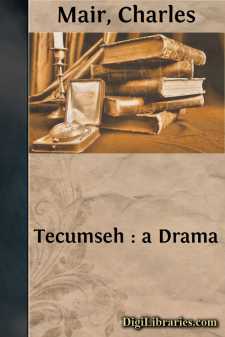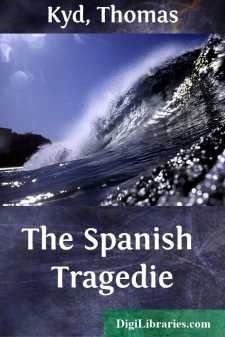Drama Books
Sort by:
INTRODUCTION I Lady Wilde once told me that when she was a young girl she was stopped in some Dublin street by a great crowd and turned into a shop to escape from it. She stayed there some time and the crowd still passed. She asked the shopman what it was, and he said, 'the funeral of Thomas Davis, a poet.' She had never heard of Davis; but because she thought a country that so honoured a...
more...
ACT I Scene 1 [Scene: A garden of the palace at Fiori; four years later.] [Discovered seated Laura, Francesca and Fidelio, Laura embroidering,Fidelio strumming his flute, Francesca lost in thought.] LAURA. You,—Fool! If there be two chords to your lute,Give us the other for a time! FRANCESCA. And yet, Laura,I somewhat fancied that soft sound he made.'Twas all on the same tone,—but 'twas a...
more...
by:
Charles Mair
SCENE FIRST.—THE FOREST NEAR THE PROPHET'S TOWN ON THE TIPPECANOE. Enter the PROPHET. PROPHET. Twelve moons have wasted, and no tidings still! Tecumseh must have perished! Joy has tearsAs well as grief, and mine will freely flow—Sembling our women's piteous privilege—Whilst dry ambition ambles to its ends.My schemes have swelled to greatness, and my nameHas flown so far upon the wings...
more...
SCENE: A large room with a door at the back and another at the side opening to an inner room. A desk and a chair in the middle. An hour-glass on a bracket near the door. A creepy stool near it. Some benches. The WISE MAN sitting at his desk. WISE MAN [turning over the pages of a book]. Where is that passage I am to explain to my pupils to-day? Here it is, and the book says that it was written by a...
more...
COLUMBINE: Pierrot, a macaroon! I cannot live without a macaroon! PIERROT: My only love, You are so intense! . . . Is it Tuesday, Columbine?— I'll kiss you if it's Tuesday. COLUMBINE: It is Wednesday, If you must know . . . . Is this my artichoke, Or yours? PIERROT: Ah, Columbine,—as if it mattered! Wednesday . . . . Will it be Tuesday, then, to-morrow, By any chance? COLUMBINE: To-morrow...
more...
ACT I SCENE I.—Soldiers and Citizens (with cross-bows) Jetter (steps forward, and bends his cross-bow). Soest, Buyck, Ruysum Soest. Come, shoot away, and have done with it! You won't beat me! Three black rings, you never made such a shot in all your life. And so I'm master for this year. Jetter. Master and king to boot; who envies you? You'll have to pay double reckoning; 'tis...
more...
SCENE: Judge Dunfumy's Court. PERSONS: Judge Dunfumy, Officer Simpson and another, Jemima Flapcakes, Cliff Mullins, John Barnes, two lawyers, a clerk, a pretty girl and her escort. SETTING: Usual court-room arrangement, except that there is a large red arrow pointing off-stage left,...
more...
by:
Aylmer Maude
ACT I Autumn. A peasant's hut, with a small room partitioned off. AkulÃna sits spinning; Martha the housewife is kneading bread; little Paráshka is rocking a cradle. MARTHA. Oh dear, my heart feels heavy! I know it means trouble; there's nothing to keep him there. It will again be like the other day, when he went to town to sell the firewood and drank nearly half of it. And he blames me...
more...
by:
Lady Gregory
ACT I Scene: A room in the King's house at Burren.Large window at back with deep window seat.Doors right and left. A small table and somechairs. Dall Glic: (Coming in with tray, which he putson table. Goes back to door.) You can come in,King. There is no one here. King: (Coming in.) That's very good. I wasin dread the Queen might be in it. Dall Glic: It is a good thought I had bringingit in...
more...
by:
Thomas Kyd
ACTVS PRIMVS. Enter the GHOAST OF ANDREA, and with him REUENGE. GHOAST. When this eternall substance of my souleDid liue imprisond in my wanton flesh,Ech in their function seruing others need,I was a courtier in the Spanish court:My name was Don Andrea; my discent,Though not ignoble, yet inferiour farTo gratious fortunes of my tender youth,For there, in prime and pride of all my yeeres,By duteous...
more...











